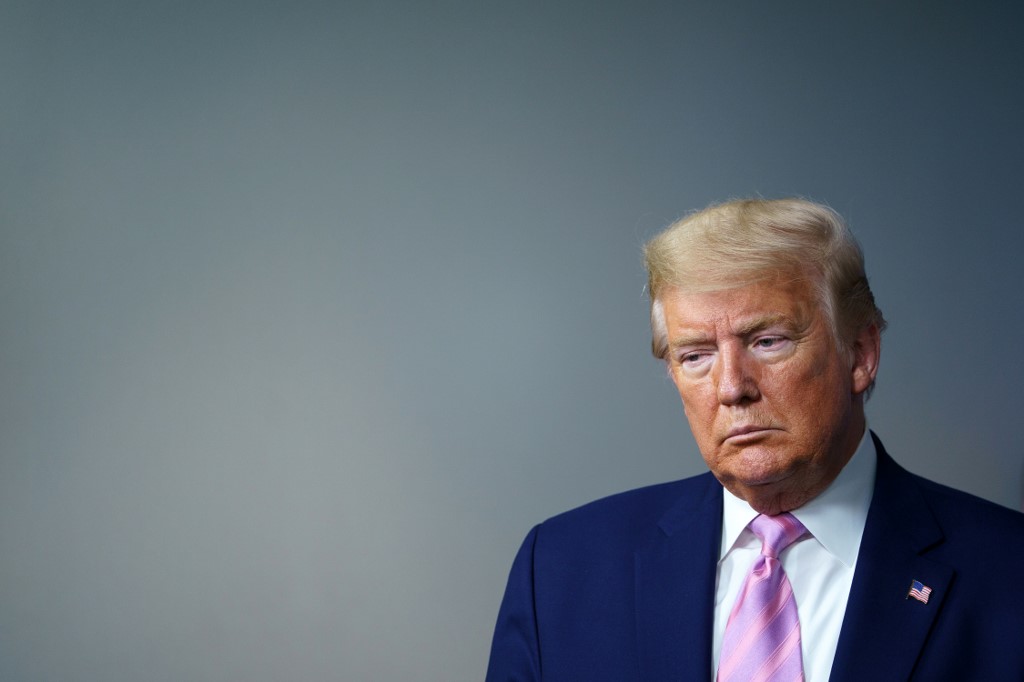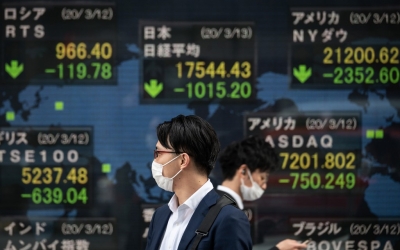US wages endless war on terror, but fails in war on coronavirus
6 April 2020 13:53 UTC | Last update: 2 days 16 hours ago
Imagine if the trillions of dollars spent on endless wars had been invested in our health infrastructure and other key systems to minimise the impact of Covid-19

A message is painted on a boarded-up shop in California amid the coronavirus outbreak on 1 April (AFP)
The United States built an entire infrastructure to counter terrorism and criminalise Muslim communities, spending nearly $6.4 trillion in wars that killed half a million people since 2001. In contrast, there has been little focus on preparing the country for the Covid-19 pandemic.
This begs the question: what is the bigger threat?
The world has been gripped by Covid-19, especially after the World Health Organization declared it a pandemic on 11 March. Across the globe, there have now been more than 1.2 million confirmed cases, more than 70,000 deaths, and counting.
In February, the US Centers for Disease Control and Prevention predicted that upwards of 60 percent of Americans could become infected. As of now in the US alone, there have been more than 337,000 confirmed cases and more than 9,600 deaths.
What would the response have been if growing numbers of people in the US were being targeted by terrorists? Would it take nearly two months to address this seriously?
These numbers will continue increasing for the next few weeks. Though President Donald Trump has now begun to respond with more urgency, his initial response calling the pandemic a hoax resulted in a serious delay in addressing the virus, leading to these catastrophic numbers.
Moreover, emerging data shows that communities of colour are disproportionately being impacted by Covid-19 in Michigan and New York City.
To address the now-acknowledged seriousness of Covid-19, the administration recently approved a $2.2 trillion economic rescue plan to support businesses and residents, aiming to alleviate the financial burden of the virus and associated lockdowns. Rather than offering universal protection however, the CARES Act excludes undocumented immigrants, thus continuing the administration's xenophobic and anti-immigrant policies that base access to resources on citizenship.
An abysmal response
What would the response have been if growing numbers of people in the US were being targeted by terrorists? Would it take nearly two months to address this seriously?
The Trump administration’s response to this unprecedented situation has been abysmal. Although the president is to blame for how Covid-19 has been handled thus far, beyond his administration, there is a longstanding reality in terms of what the US prioritises when it comes to the safety and security of its residents - and it’s not public health.
It is not, for example, the destruction that climate change is creating, which includes permanent threats to our ability to survive. Nevertheless, energy and resources continue to be wrongly spent on criminalisation of communities and issues that are disproportionately and strategically constructed as threats for reasons beyond national security.
For example, the US will swiftly respond to terrorism cases, and is even trying to use terrorism as a vehicle to fight Covid-19, which is a waste of resources. In other words, the government has demonstrated that only terrorism requires an immediate and robust response.
The "war on terror" - one built on structural and institutionalised Islamophobia - demonstrates as much, as it resulted in putting multiple systems in place to combat terrorism almost immediately after 9/11. Eighteen years later, the war has cost $6.4 trillion and yet there is no affirmative answer as to whether or not the United States is safer.
Embedded systemic violence
The war on terror has now spanned three administrations, and embedded systemic violence coupled with new problematic policies has meant that each administration’s counterterrorism tactics have built off the previous ones. Thus, while the Covid-19 response has fallen squarely in Trump’s court, existing systems and legacies are partly to blame for his handling of the pandemic.
When it comes to the war on terror, the contrast in the speed of addressing different threats to the country shows how policy responses are developed based on the extent to which a problem, such as terrorism, can be constructed as inherently more threatening to our security than others, such as a pandemic, regardless of the actual impact.
Case in point: within a week of the 9/11 attacks, on 18 September, the Authorisation for Use of Military Force came into law, which essentially allowed the US to treat the entire world as a battlefield and - in violation of various countries’ sovereignty - to go after suspected al-Qaeda and Taliban leaders.

A month later, in October 2001, the US launched the Afghanistan war - now the longest war in US history. Later in October, the Patriot Act, which criminalised Muslims under the guise of material support for terrorism, was also signed into law.
Then, in November 2001, President George W Bush issued a military order titled “Detention, Treatment, and Trial of Certain Non-Citizens in the War Against Terrorism.”
Lest anyone think that the war on terror ended, regardless of what name it assumes, it is still in full effect.
Since December 2019, as fears were growing in China around Covid-19, the US has launched missiles in Iraq and Syria, conducted drone strikes in Yemen, and killed an Iranian general.
Just last month, as the WHO declared a coronavirus pandemic, the US bombed Iraq, targeting an Iran-backed militia allegedly responsible for an earlier attack that killed and wounded US and British troops.
'Invisible enemy'
Far from being exceptional, however, the post-9/11 years are just a contemporary example of how narrowly the US conceives of its military-industrial complex as the sole apparatus on which the safety and security of this country depends - an attitude typically based on greed and profit.
Another reason why the US response to Covid-19 has been woefully inadequate is that unlike terrorism, there is no visible or human enemy.
But this hasn’t prevented Trump from utilising “enemy” rhetoric, by describing Covid-19 as the Chinese virus, the only way that the US government seems able to operate under. Trump has described himself as being on a war footing, battling against an “invisible enemy”.
Unlike other “enemies”, though, Covid-19 can’t be detained, killed by war, or stopped at borders in the form of bans or walls.
Even by using the “enemy” term, the resources devoted by the Trump administration to Covid-19 - while it poses a greater threat to US citizens - have not matched the scale of counterterrorism operations.
In the meantime, people’s lives are being threatened with each passing minute, and the national security imperative to protect innocent people has fallen seriously short.
Imagine if the resources spent on endless wars had been invested into our health infrastructure, employment, education, food security, affordable housing, transportation, urban planning, and other key systems to help build our resilience in minimising the detrimental impact of pandemics such as Covid-19. Instead, the US has invested more on the prison system and immigration detention facilities.
Investing in care
When there are more prison beds than emergency room beds, the US’s problematic priorities are exposed. When we invest more in surveillance, drones, and the murder of millions of people globally than in preparing for a pandemic, we have failed our society and our people miserably.
At this moment, we have a choice. We must demand that policymakers recognise how detrimental their priorities have been all along. It’s time to divest from wars and systems built upon oppression, and to invest in structures of care and kinship.
We have to build an effective public health and social response amid growing threats of pandemics and climate disasters - threats over which we have little direct control.
The security threat to our communities is the state’s failure to invest in what we need, rather than structures of violence and oppression that have never served us collectively.
The views expressed in this article belong to the authors and do not necessarily reflect the editorial policy of Middle East Eye.



0 Comments:
Post a Comment
Subscribe to Post Comments [Atom]
<< Home